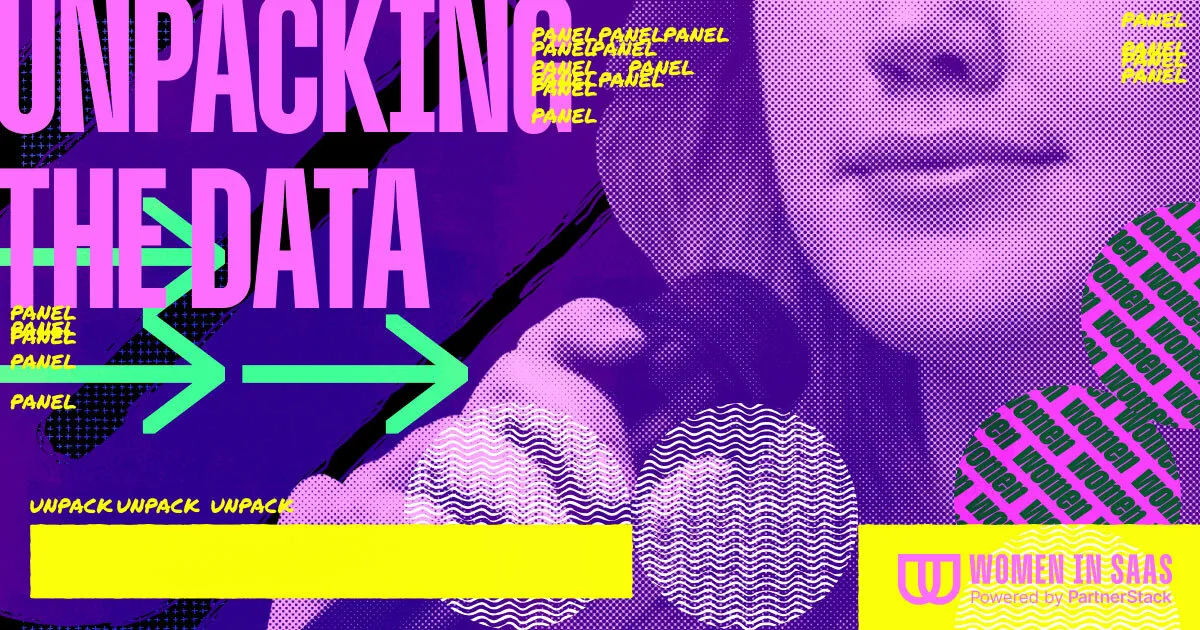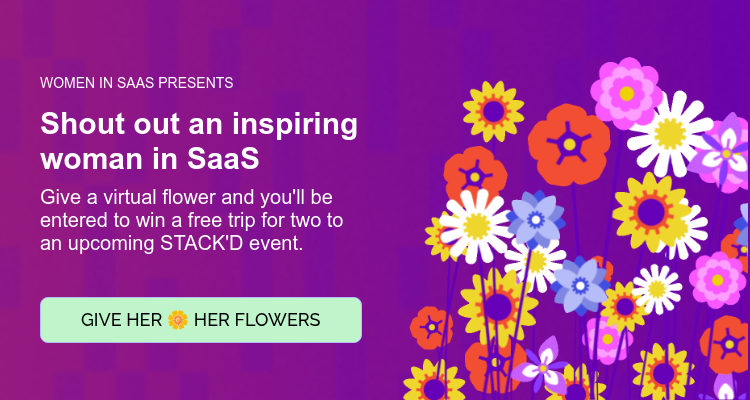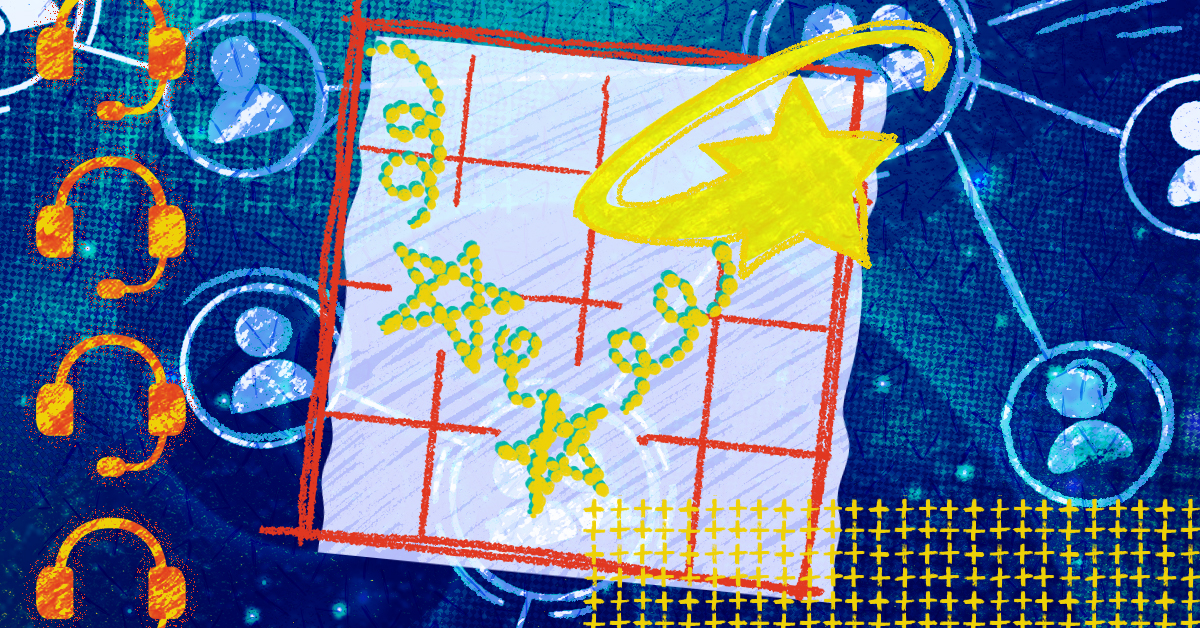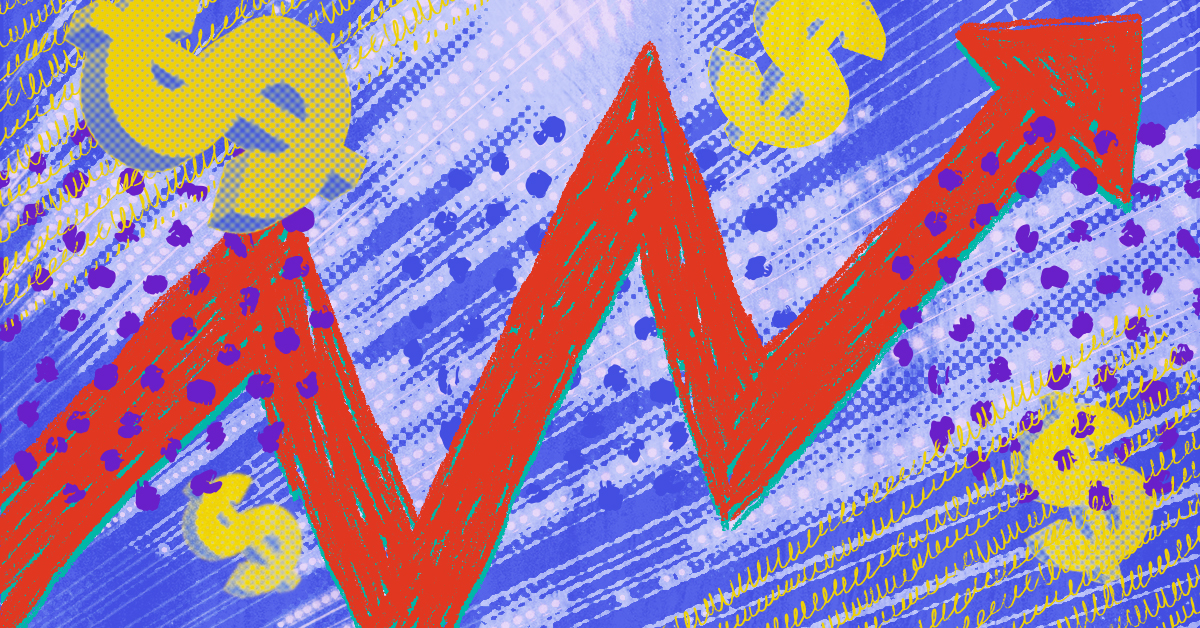It’s no secret that women play a vital role in the SaaS ecosystem — but what does their reality look like today, and what will it take to drive equality for women in the industry?
This year, PartnerStack marked Women’s History Month with a campaign highlighting the challenges, perspectives, triumphs and voices of women in SaaS — along with data to back it up and spark meaningful conversations. To help make this happen, PartnerStack worked with nine partner organizations to gather the data and spread awareness about the campaign.
Then, on International Women’s Day 2025, PartnerStack launched with the Women in Saas 2025 Report, a comprehensive data report sharing insights from over 100 women leaders from various B2B SaaS companies.
To unpack the report’s findings and drive discussion, PartnerStack hosted a corresponding panel discussion on March 25, 2025: Unpacking the Data: Women in SaaS 2025. It featured a panel of campaign partners — women leaders who shared their lived experiences, wisdom and strategies for driving change.
Ready to dive in? Read on for key highlights from the report and panel discussion — plus details on a new digital campaign designed to recognize the women in SaaS who inspire you.
Women in SaaS 2025: Sharing data and insights
To better understand the realities women face in SaaS — and to give them a platform to share their experiences — PartnerStack gathered data and insights through a detailed report and an online panel discussion.
The Women in Saas 2025 Report collected real-world data through an anonymous survey conducted in 2024 and 2025. More than 100 women leaders — those who identify as women, including trans women — from across B2B SaaS participated, representing executive leadership, marketing, product, sales, partnerships and more.
The report uncovered both the critical contributions women are making and the persistent barriers that remain, including:
- 84% of respondents contribute to revenue growth at their company.
- 76% of respondents believe women have a significant influence on purchasing software at their organizations.
- 94% of respondents have faced gender discrimination in their careers.
Building on the report’s findings, PartnerStack hosted a companion webinar, Unpacking the Data: Women in SaaS 2025, featuring a panel of women leaders who participated in the survey.
Panelists included Başak Büyükçelen, CEO of Pressbooks; Breanne Charter, sales director at ContactMonkey; Jessie Shipman, founder and CEO of Fluincy; and Veronica Stonis, VP, Global Ecosystem Sales.
The discussion, moderated by PartnerStack’s Chloe Tse and Lydia Hrycko, explored topics including:
- Unpacking the demographic representation in today’s SaaS industry
- Showing up as your authentic self as a woman in SaaS
- The impact of mentorship from women leaders in SaaS
- Strategies for measuring and demonstrating impact
- The challenges of advocating for yourself in a male-dominated industry
Let’s touch on some of the highlights of these discussions.
Unpacking the demographic representation in today’s SaaS industry
Though perhaps not surprising, the report showcased the underrepresentation of certain demographics in the industry, specifically how:
- In terms of racial or ethnic identity, the vast majority of respondents (71%) self-identified as white or Caucasian, followed by respondents identifying as East Asian or Pacific Islander (11%), South Asian (5%), Black or African (3%) and Middle Eastern or North African (2%). The remaining respondents were either a race or ethnicity not listed (3%) or preferred not to self-identify (2%).
- In terms of sexual identity, the vast majority of respondents (78%) self-identified as heterosexual, followed by respondents identifying as bisexual (8%), queer (5%) and lesbian (2%). The remainder of respondents opted out of self-identifying.
- In terms of job seniority level, the majority of respondents (43%) are in management or team lead positions, 22% are in C-suite and executive roles, 22% hold individual contributor positions and 11% are in senior management and director positions.
Looking at the demographics represented in the report, Jessie Shipman, founder and CEO of Fluincy, emphasized the importance of building on existing progress to further increase diversity and representation for more underrepresented groups.
“I don't think it's a terrible surprise that the majority of the respondents were white women, but I think that demographics have a tendency to have a long tail,” Shipman said. “If we look at the availability of opportunity over the last 20-ish years in the workplace, white women have benefited from that more than women of color.”
Shipman added, “It will be really important moving forward and recognizing some of those statistics. If it's a 20-year tail to get white women into places where they're in positions of leadership and can be business decision-makers, what did we do 20 years ago that started that? How do we apply and maybe accelerate some of those results or those actions to get to those results for women of color and other diverse groups?”
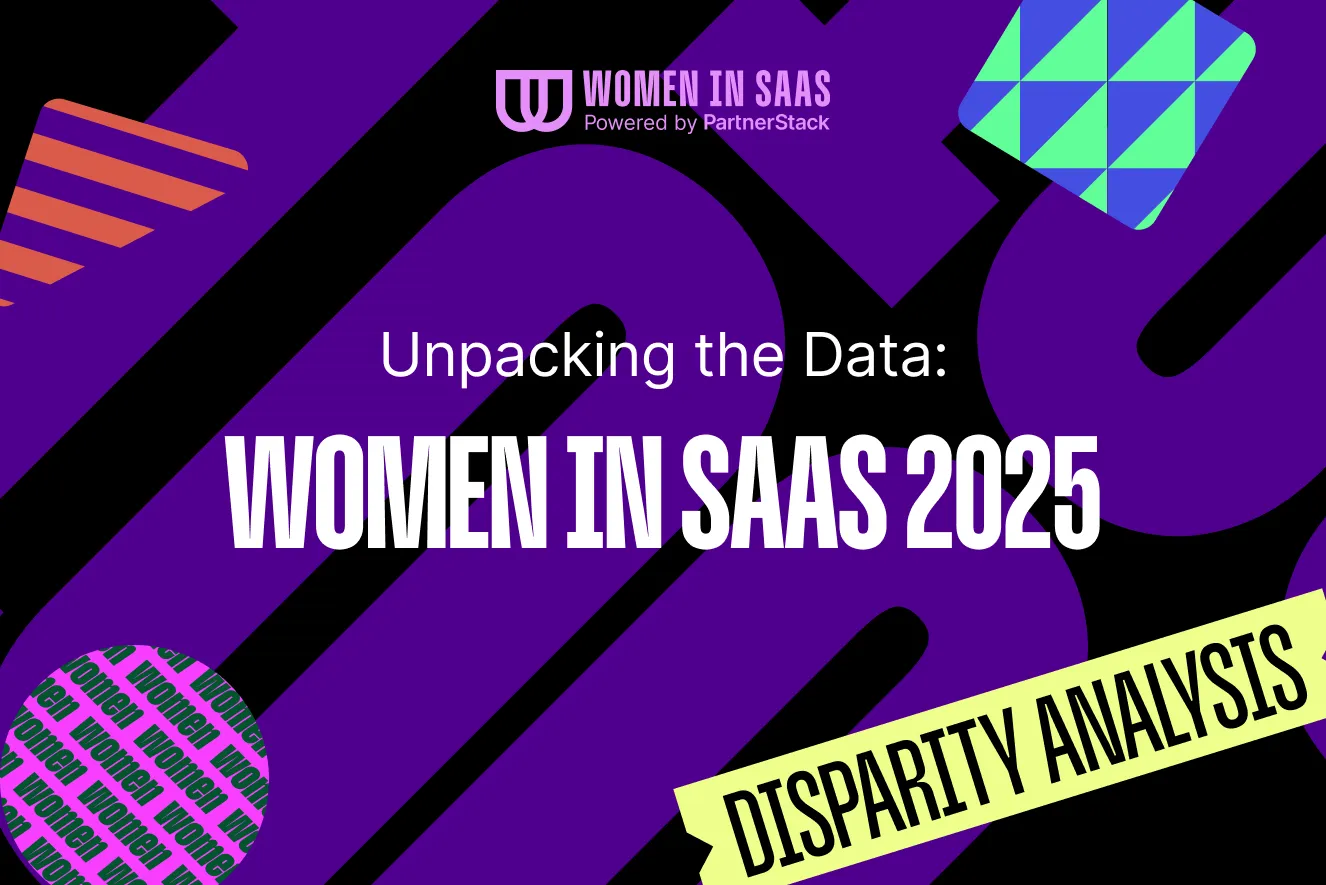
Showing up as your authentic self as a woman in SaaS
If women and diverse groups are underrepresented in the industry, how can leaders promote diversity in the workplace?
One strategy, as Başak Büyükçelen, CEO of Pressbooks, shared is showing up as your authentic self.
“We're always told that you have to act in a certain way or you have to fit in a certain mold when you're management, or even if you're just a person that shows up to work,” Büyükçelen says. “You have to be professional, but there's a lot that we're asked to leave behind, and some of that touches upon us as humans.”
“I think when we're in leadership roles, it's easier said than done to say we have to lead by example, but I try to show that a lot at work by actually showing up with all of my personality — that includes my flaws and the mistakes that I make — to show that it is okay for me to be human. It's okay for me to be myself.”
The impact of mentorship from women leaders in SaaS
The panelists also discussed the importance and impact of women mentors — both for their own careers and as mentors of others.
Veronica Stonis, VP, Global Ecosystem Sales, credits a mentor who believed in and championed her potential early in her career who not only shaped her career but also inspired her efforts to mentor other women today.
Stonis shared that 20 years ago, “I knew nothing about technology. I'd never sold anything, never worked in it, and quite frankly, I had no idea that I was going to be successful in doing this, but Christine believed that I would. She told me, ‘You'll learn it,’ and she was right. I took the leap, and I discovered my true calling.”
“She was actively acting to change the industry back then and opening doors for women in tech, empowering them to step into leadership roles and proving that we belong at the table.”
“Leadership isn't about being the smartest person in the room. It's about believing people before they believe in themselves and it's about lifting others up.”
“If you're in a position to lead, mentor or open doors for someone else, do it. You'll never know whose life you might change.”
Strategies for measuring and demonstrating impact
Many women in SaaS are working to make an impact while navigating gender-based discrimination and fewer opportunities than their peers.
A key challenge many women in SaaS face is effectively measuring their impact at work and “bragging” about it — without feeling uncomfortable or like they have to unduly defend or justify their success. The report highlights some relevant statistics:
- 57% of respondents experience a lack of opportunities in their careers
- 94% of respondents experience multiple forms of gender-based discrimination in their careers
- 85% of respondents face gender-based microaggressions
- 82% face pay disparity
Breanne Charter, sales director at ContactMonkey, shared how she pushes herself to embrace confidence and challenge herself to raise her hand and put herself forward
“It's not about necessarily bragging about the success or what I have accomplished, but owning what I have done. Making sure that I am tracking when I have a great quarter, when my team does X and owning that I was able to accomplish this and stamp my name on that.”
“Others around you take notice, so when there's another opportunity, maybe they put their hand up because X-Y-Z person did it and it turned out well for them.”
However, Charter emphasizes that women shouldn't feel pressured to work harder simply to earn a seat at the table.
Instead, “When you stand up and use your voice and articulate yourself in a way that we all know we're able to do, people will then look to you when a decision is being made because they know that you have a voice — and not only that you have a voice, but that you want to be heard and considered in that decision-making process.”
The challenges of advocating for yourself in a male-dominated industry
Women face many challenges when it comes to being recognized in B2B SaaS — a male-dominated industry where progress for women can feel slow.
Echoing this sentiment, multiple panelists shared how exhausting it can be to have to constantly advocate for themselves in ways their peers may never have to.
“These conversations can be uncomfortable,” Charter said. “Things can get a little bit exhausting sometimes, because we're having to advocate for ourselves and we're having to justify things that we don't necessarily feel we have to justify.”
Yet, despite these challenges, the report found that most women leaders remain resilient and optimistic about the future. In fact, 79 per cent of respondents rating their confidence in the future of women in SaaS as seven or higher.
Data in the report also provides some support for this optimism and hope for equality in the future, as more than half of survey respondents were promoted both in compensation and/or title in the last year.
Recognizing women in SaaS: Give Her Her Flowers
A key takeaway from the panel was the power of women uplifting other women — investing in their growth, amplifying their voices and creating more leadership opportunities in SaaS.
As Shipman said, “if there are more women who invest in more women, who then invest in the leadership abilities of those women, that's how all ships rise together.”
Building on these ideas, PartnerStack has launched Give Her Her Flowers, a digital experience celebrating and recognizing women in SaaS. The experience allows people to submit free shoutouts to inspiring women in SaaS you’ve worked with who deserve recognition.
Each shoutout will appear as a flower in a digital bouquet, where users can hover over individual blooms to read the personalized messages. You can choose from flowers for women whose good work often goes unrewarded, who break down barriers, create revenue impact and more.
As part of the campaign, PartnerStack will donate $1 for every flower sent to AnitaB.org, a charitable organization that empowers women and nonbinary individuals in and around the tech industry. Plus as a bonus, one lucky pair — a flower sender and their recipient—will win a trip for two to an upcoming PartnerStack STACK'D event (terms and conditions apply for the giveaway).
